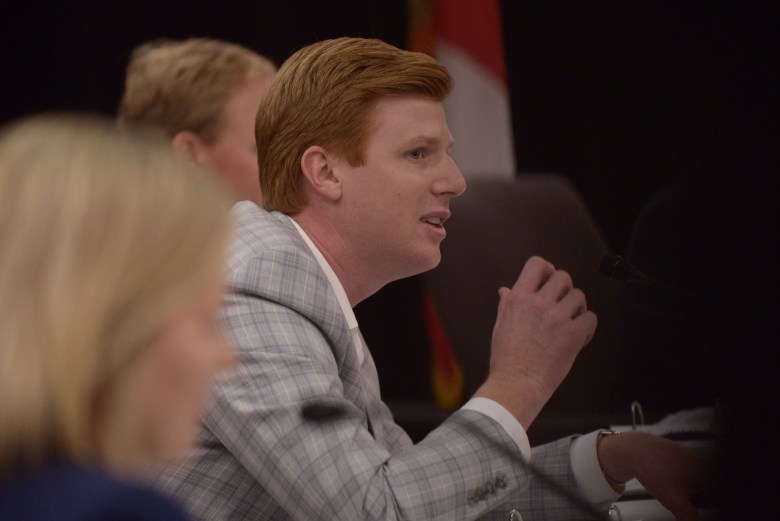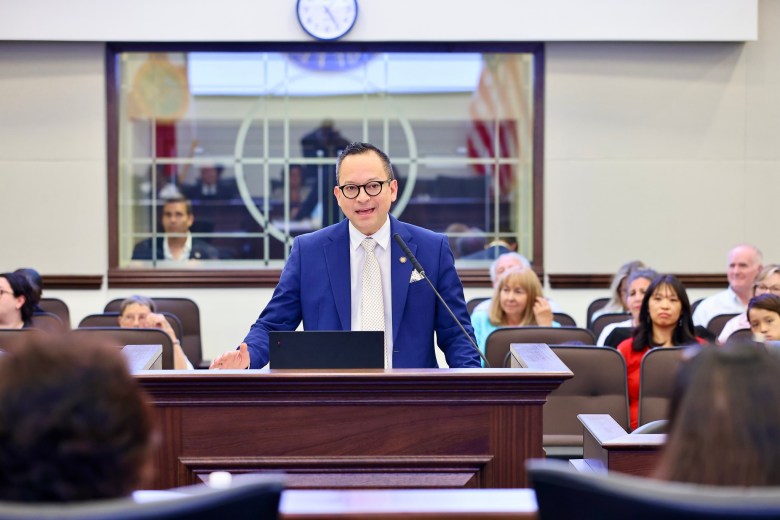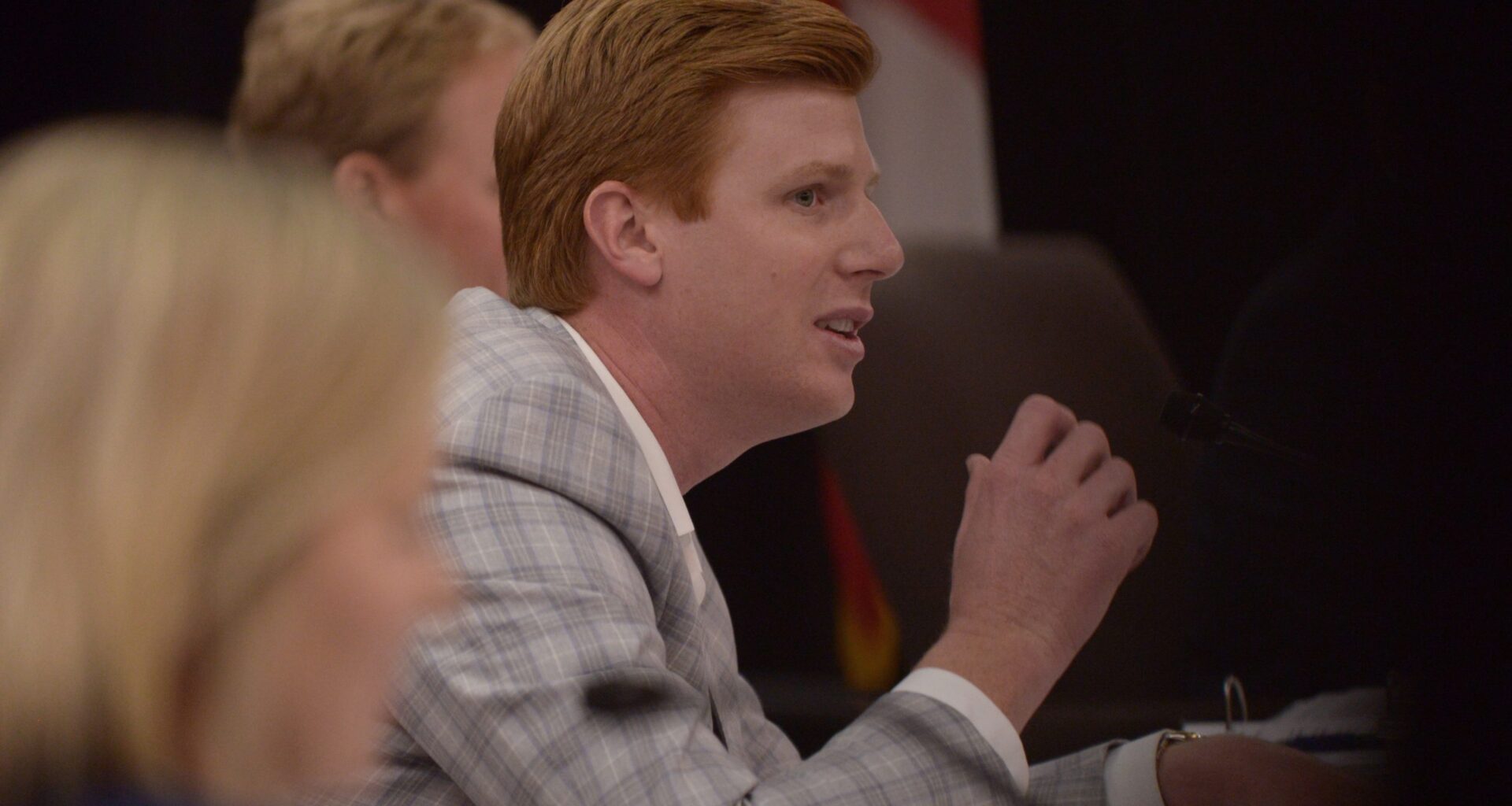 Joshua Kellam in Havana, Florida in February 2018. Credit: Tim Donovan / myfwcmedia/Flickr
Joshua Kellam in Havana, Florida in February 2018. Credit: Tim Donovan / myfwcmedia/Flickr
“I’m a developer,” said FWC Commissioner Joshua Kellam, describing the makeup of Florida Fish and Wildlife Conservation Commission (FWC).
Kellam previously served on the commission and is back to replace Gary Nicklaus, who resigned this year ahead of a controversial bear hunt vote. Kellam is an executive at real estate development firm The Garcia Companies. He argues another developer should have a place on the conservation commission, even as constituents and lawmakers are questioning why the majority of today’s seven governor-appointed commissioners are development industry professionals.
“The public, I think, misses out a lot on what the agency does in working with developers,” Kellam said at an FWC meeting on Aug. 13 as he worked as a commissioner ahead of his own official confirmation.
Two months later, at an Oct. 7 meeting of the Environment and Natural Resources Committee, Sen. Carlos Guillermo Smith (D-Orlando) grilled Kellam on his qualifications, questioning the addition of another developer to the commission and what he characterized as Kellam’s bias toward lethal bear control methods.
 Sen. Carlos Guillermo Smith Credit: carlosguillermoforflorida / Facebook
Sen. Carlos Guillermo Smith Credit: carlosguillermoforflorida / Facebook
“It’s not that there shouldn’t be a development perspective at all. The push and pull of conservation is you’re always gonna have to balance conservation with development. But having the deck stacked in favor of development in this way is just absurd, and it’s very telling about how that has impacted the current situation as it relates to our state’s conservation efforts,” Smith said.
Kellam otherwise breezed through subsequent hearings amid broader public opposition to the commission’s developer-heavy composition, with Smith being one of just two votes against his confirmation.
“My mission is not to be a rubber stamp for the governor’s appointees. My mission is to ensure that we are doing right by Florida’s environment, by our wildlife, by our conservation goals,” Smith told Creative Loafing Tampa Bay. “The mission at the FWC is just not being served when there’s no biologists, no conservationists, no one who authentically has a history and experience of furthering the mission of conservation on that board.”
Florida’s wildlife agency has been under intense scrutiny following a series of controversial decisions that appear to depart from its core conservation mission. These issues—including the proposed development of state parks, the death of a manta ray, a controversial bear hunt, and the firing of a biologist—make it important to examine the relationship between development and conservation in Florida’s dedicated wildlife agency.
Senate confirmation records reveal that FWC commissioners overwhelmingly come from real estate and development, the most heavily represented category in the commission’s history. The data suggests institutional capture of a conservation agency by the industries it is meant to regulate.
FWC Commissioners and Occupations
Commissioner Name
First Appointed
Appointing Governor(s)
Occupation
Quinton L. Hedgepeth
1991
Lawton Chiles
Healthcare (Dentist)
Robert D. Woodward, III
1991
Lawton Chiles
Agriculture/Real Estate
Robert Q. Marston
1991
Lawton Chiles
Healthcare/Education
George R. McElvy
1992
Lawton Chiles
Construction/Real Estate Development
Leslie Ireland Humphrey
1994
Lawton Chiles
Conservation/Environmental
Donald R. Hansen
1994
Lawton Chiles
Education
Thomas Bryant Kibler
1995
Lawton Chiles
Agriculture/Ranching
Patrick Emmett Geraghty Sr.
1995
Lawton Chiles
Law (Real Estate)
Julie K. Morris
1997
Lawton Chiles
Education
James L. Adams, Jr.
1997
Lawton Chiles
Law Enforcement
Barbara C. Barsh
1997
Lawton Chiles
Regional Planning
Reginald A. (Tony) Moss
1997
Lawton Chiles
Criminal Defense Attorney
Edwin P. Roberts
1999
Jeb Bush
Healthcare (Chiropractor)
Hersey A. Huffman
1999
Jeb Bush
Real Estate Development
John Darrell Rood
1999
Jeb Bush
Real Estate Development
David K. Meehan
1999
Jeb Bush
Finance/Real Estate Development
*Rodney L. Barreto
2001
Jeb Bush; Charlie Crist; Ron DeSantis
Real Estate Development
Sandra T. Kaupe
2002
Jeb Bush
Agriculture/Ranching
Richard A. Corbett
2003
Jeb Bush; Rick Scott
Real Estate Development
Kathy Barco Lane
2004
Jeb Bush
Construction
Brian S. Yablonski
2004
Jeb Bush; Charlie Crist; Rick Scott
Conservation/Politics
Ronald M. Bergeron
2007
Charlie Crist; Rick Scott
Real Estate Development
Charles W. Roberts, III
2011
Rick Scott
Construction
Aliese P. Priddy
2012
Rick Scott
Agriculture/Ranching
Adrien A. Rivard, III
2013
Rick Scott
Law
Richard L. Hanas
2014
Rick Scott
Agriculture/Ranching
Robert A. Spottswood
2015
Rick Scott; Ron DeSantis
Real Estate Development
Michael W. Sole
2017
Rick Scott
Energy
*Sonya A. Rood
2017
Rick Scott; Ron DeSantis
Real Estate Development
Gary T. Nicklaus
2018
Ron DeSantis
Golf Course Development
*Joshua Kellam
2018
Rick Scott; Ron DeSantis
Real Estate Development
*Gary L. Lester
2018
Rick Scott; Ron DeSantis
Real Estate Development
*Steven W. Hudson
2019
Ron DeSantis
Real Estate Development
*Albert R. Maury
2022
Ron DeSantis
Healthcare
*Preston L. Farrior
2023
Ron DeSantis
Auto
Note: FWC consolidated after 1998.
* = Current commissioner as of 2025.
The FWC took its current form in 1999 after a constitutional amendment merged several predecessor agencies to create a unified, constitutional entity responsible for managing the state’s fish and wildlife.
On its website, FWC defines conservation as stewardship “of our living resources and the habitats that support them.” The agency writes about “managing fish and wildlife resources for their long-term well-being and the benefit of people.”
“When somebody uses the term development, it conjures in our imagination all kinds of ways that we human beings transform the planet to support the way we live,” said Dr. Nick Quinton, a professor of Geography at Florida State University, adding that conservation and development can take many forms, but both are ultimately bound together.
“You don’t need conservation without development. A society that isn’t developing this way doesn’t need conservation. You don’t need to conserve nature if you’re not radically transforming nature,” Quinton said.
A commissioner’s professional background inevitably shapes their approach to conservation, influencing the outcome of conservation practices.
“We all bring our experience with what we’ve been doing into the roles that we serve in. If you have a scientist who has spent their professional life in mangrove swamps studying the distribution of box turtles, they’re going to bring a very different framing of what management for natural and wildlife resources is than someone who has spent their career transforming the landscape into suburban residential communities and shopping centers,” Quinton said.
Data shows that under the late Governor Lawton Chiles, the commission was more professionally diverse than it has been at any point since the FWC’s consolidation in 1999.
Tony Moss, a Miami-based criminal defense attorney and avid fisherman, was one of Chiles’ last appointments to the commission.
Moss recalls a commission in the late-’90s where commissioners from different professional backgrounds came together because of their shared love for the outdoors.
“During the time that I was on, we really did not have any, as I recall, we didn’t have any hot button issues where parties would take positions based on ideological grounds or grounds rooted in their professional perspective,” told CL. “Because we have a sizable number of Commissioners who are also outdoor enthusiasts, there was kind of a mutual recognition of our missions. We were more oriented toward erring on the side of caution and enacting regulatory measures.”
Moss would also like to see professional diversity return to the commission. With a commission where developers are so heavily represented, Moss is concerned there is “too much potential for group think on issues that would be a direct concern to the resource.”
Yet, according to Kellam, he isn’t just another developer, but a conservationist as well. “I stand here today as a conservationist, I pride myself on being a conservationist,” he told the Senate environment committee despite his professional background.
“It’s hard to call yourself a conservationist when you’re in the business of development,” Smith told CL.
A new governor election marks a chance for voters to push candidates for reform of the commission, as the next governor will have the opportunity to appoint new commissioners.
“Reform of FWC would ensure that you have real conservationists represented on the board, that there’s someone who’s a biologist, someone who’s a scientist, someone that has a professional history of work and advocacy in the wildlife and land conservation space,” Smith said.
Subscribe to Creative Loafing newsletters.
Follow us: Google News | NewsBreak | Reddit | Instagram | Facebook | BlueSky
Related

